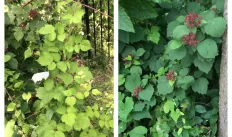Why are Invasive Plants so Bad?
Variously called alien, introduced, or exotic; non-native plants are highly invasive. Invasive species are a major threat to our environment because they can rapidly, and drastically, change an entire habitat, placing native ecosystems at risk by crowding out, replacing, or completely removing native species from the ecosystem. Native ecosystems reside in a state of natural balance. When non-native plants enter a balanced system, they disturb the balance, sometimes producing such deleterious effects as creating toxins lethal to local animals, altering hydrological patterns, fire regimes, or even changing soil chemistry. In the extreme, invasive plants might contribute to the extinction of native species, with uncertain long-term results to the entirety of the native ecosystem that they have been introduced.
Within the next century, the greatest threat to our native plants, and other native species that depend upon them, may well come from invasive plants. Thousands of plant species have been brought to North America in the past three centuries. Most are well-behaved, rarely penetrating natural areas. However, several hundred have escaped into such areas having no natural controls here. Thus, these plants can, and do, out-compete and gradually displace our native plants, altering the natural ecosystems native to the country (Maryland included!).
Additionally, these plants can damage human enterprise -- costing the local economy millions of dollars. Hence, the Sierra Club is constantly targeting newly discovered and stubbornly surviving invasive plant species to remove- and we need your help! Join us in outings to remove invasive plants: check the Maryland Chapter’s Events Calendar for the next available outing near you, or, look here for specific invasive plant removal outings.
For more inspiration, check out this blog from the summer 2016 stewardship interns.
Additionally, here's an article that explains the connection between Lyme Disease and Invasive Plants from the Maryland Invasive Species Council.
What Can You do from Home?
Remove invasive non-native plants from your property if at all possible (see our online guide to non-native invasive plants). Many common garden plants and weeds are already causing significant changes to natural areas within the Mid-Atlantic. Many of these plants were brought here intentionally, for their medicinal, ornamental, or food-based value. Others hid in soil, crop seed, or ballast. A majority came from other continents, but a few have spread from other parts of the US. Many of these non-native plants are popular landscape plants, but they still pose a threat to our native environment. If you cannot effectively contain these plants within your property, by clipping seeds, fruits, or runners, please consider properly removing them. It is a difficult decision, but each of us has a responsibility to prevent damage on the local ecosystem; the ecosystem that cleans our air and water, stabilizes our soil, provides flood buffers, and bears food and shelter for an innumerable variety of species other than our own.
When evaluating exotic plants for your garden, ask these questions:
-
Does it naturalize or self-sow? How far does it spread? Are the seeds spread by wind or water? If so, don't plant it unless you are prepared to remove all seeds, every year.
-
Is it a wildlife food plant? If the answer is yes, wildlife will spread it to woods and wetlands. In other words, these are plants to avoid. Plant natives instead.
-
Is it a rapidly spreading ground cover? If so, don't plant it adjacent to open space.
-
Is it low maintenance -- hardy, tolerant of drought or flooding, shade-tolerant, pest-free? If so, it has no natural controls here. Do not plant it if it can spread out of the garden.
-
Can it kill or suppress the growth of surrounding plants by shading them out, chemically poisoning them, or out-competing them for food and water? (Norway maple, a common landscape tree, is a prime example.) If so, you don't want it in your garden anyway as it will kill your other plants!

